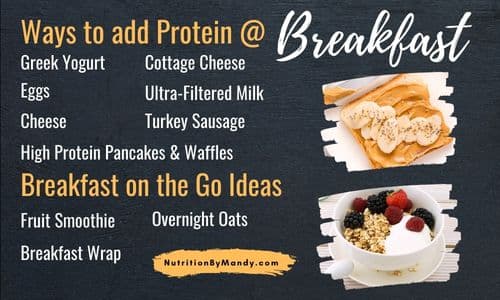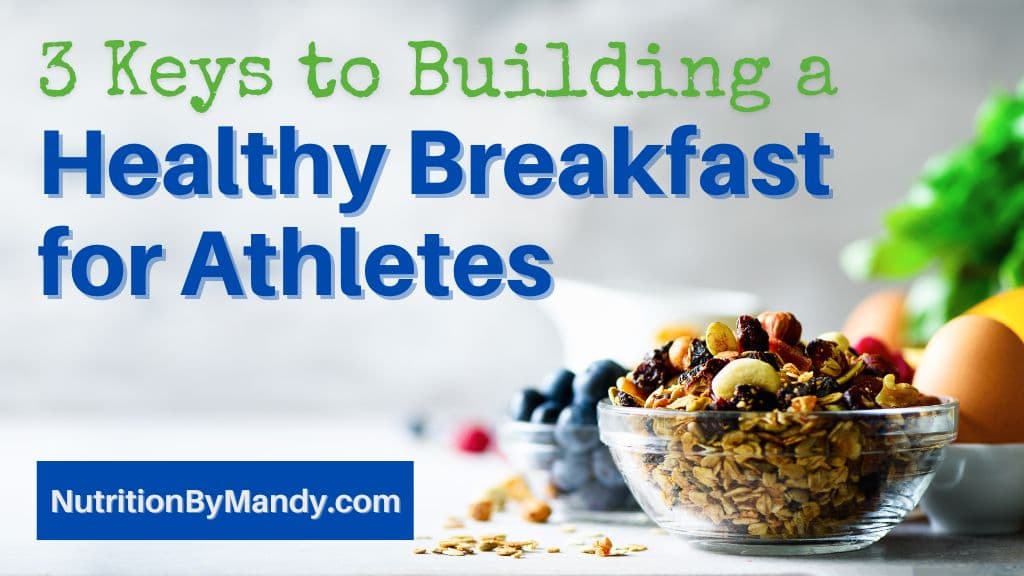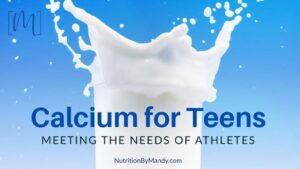Last Updated on August 12, 2023 by Mandy Tyler, M.Ed., RD, CSSD, LD
3 Keys to Building a Healthy Breakfast for Athletes
*This article includes affiliate links. As an Amazon Associate, I earn from qualifying purchases.
Starting the day with a healthy breakfast is an important part of an athlete’s sports nutrition meal plan. Breakfast provides athletes with the energy needed to perform at their best all morning long. Let’s look at three keys to building a healthy breakfast for athletes.
Key 1: Plan Ahead
Athlete should make sure to plan their breakfast ahead of time so that a lack of time is not an excuse to skip their morning meal. It can be helpful for athletes to meal prep their breakfast on the weekends. This way when they are in a hurry, on a busy weekday morning, they have healthy breakfasts ready to go.
Easy meal prep tasks that athletes can do ahead of time include:
- Chop fresh fruit
- Hard-boil eggs
- Prepare overnight oats
- Bake high-protein muffins
It is important for athletes to also make plans for eating a healthy breakfast on the weekends. Athletes should not fall into the temptation of sleeping in on the weekends and skipping breakfast. If athletes are serious about their sports nutrition game plan, then they don’t want to miss an opportunity to fuel their bodies with breakfast.
Breakfast for Athletes: Plan for Variety
As athletes plan their breakfasts for the week, they should aim to include a variety of whole grains, fruits, vegetables, dairy, protein, and healthy fat sources.
There is no one super food, as different foods provide a variety of nutrients that support an athlete’s health and sports nutrition needs. Athletes should try to rotate food items throughout the week rather than eating the same thing for breakfast every day.
Key 2: Select Nutrients to Support Healthy Breakfasts for Athletes
When planning what items to include in a breakfast for athletes, focus on building a balanced meal that provides the following key nutrients:
- Carbohydrates
- Lean protein
- Healthy fats
Let’s explore a variety of ways for building a healthy breakfast for athletes that includes these nutrients and meets their sports nutrition needs.

Carbohydrates
The foundation of an athlete’s breakfast should be carbohydrate-rich food choices. Carbohydrates provide the body with the energy needed to perform at its best. Athletes can get carbohydrates in their diet from a variety of food groups, including:
- Grains
- Fruit
- Starchy Vegetables
- Dairy
Whole Grains
Whole grains are a great way for athletes to add carbohydrates, fiber, vitamins, and minerals to their breakfast. Athletes should look for whole grain breads, bagels, English muffins, tortillas, wraps. quinoa, oatmeal, and breakfast cereal to add to their morning meal.
When selecting whole grain items, athletes need to read the package to ensure the product is whole grain. When reading the ingredient list, the word “whole” should be listed as the first ingredient in the product. For example, look for products containing whole wheat, whole oat, or whole rye.
Fruit
Fruit is an excellent carbohydrate choice for athletes. In addition to carbohydrates, fruit contains fiber, vitamins, minerals, phytochemicals, and antioxidants. Fresh fruit can be used as a topping for pancakes, mixed into breakfast cereal, or enjoyed as a side with the meal. Athletes can also enjoy a glass of 100% fruit juice to increase the carbohydrate, vitamin, and mineral content of their breakfast.
Frozen and Dried Fruit
Frozen fruit is also a great option for athletes at breakfast. When fruit is frozen, it is flash-frozen at the peak of ripeness. Thus, it retains a similar nutrient content to fresh fruit. Keep frozen fruit available for fruit smoothies, as an ingredient for overnight oats, or to add to a fruit and yogurt parfait.
Dried fruit is another easy way for athletes to increase the carbohydrate, fiber, vitamin, and mineral content of their breakfast. Dried fruit, such as raisins, cranberries, pineapple, and mango, makes a great addition to oatmeal and breakfast cereals.

Starchy Vegetables
Enjoying starchy vegetables, such as potatoes, sweet potatoes, beans, and legumes, at breakfast is a nutritious way to boost the carbohydrate content of an athlete’s meal. Athletes can consider adding diced potatoes or black beans to a breakfast bowl or roasting sweet potatoes to enjoy as a side dish with their meal.
Milk and Yogurt
Athletes can add milk and yogurt to their breakfast, which provide both carbohydrates and protein. Dairy items also contain calcium and many are fortified with Vitamin D, which are both important for promoting bone health.
Add Lean Protein to a Healthy Breakfast for Athletes
To get the most benefit from protein intake, athletes are encouraged to consume protein throughout the day with meals and snacks (1). In general, athletes tend do a great job with consuming protein at lunch and dinner, but protein intake at breakfast is often lacking. Therefore, adding protein at breakfast is a strategy I often focus on with athletes.
Protein recommendations for athletes are based upon body weight. Athletes are encouraged to consume ~0.25-0.3 grams of protein per kg of body weight with meals and snacks spaced evenly throughout the day. For a 175-pound athlete this would equal ~20-24 grams of protein.

Greek Yogurt
Greek yogurt is a great way to add protein to breakfast for athletes. A 5.3 oz individual container of Greek yogurt contains ~13 grams of protein (2). Athletes can consider making a parfait with Greek yogurt, frozen berries, and whole grain breakfast cereal for a nutritious start to their day.
Eggs
Eggs are an easy way to add protein, vitamin, and minerals, to an athlete’s breakfast. One large egg contains 6 grams of protein. The majority of the protein in the egg comes from the egg white (4 grams). However, the yolk is rich in vitamins and minerals.
Eggs contain choline, important for cognitive function, as well as selenium, riboflavin, Vitamin K, and antioxidants (1). Thus, eggs are a nutritious addition to an athlete’s morning meal.
Turkey Sausage
If an athlete enjoys breakfast sausage in the morning, they should consider making the switch to turkey breakfast sausage. Turkey breakfast sausage is a leaner option, containing less saturated fat, than regular pork sausage.
Athletes can include turkey sausage on a breakfast sandwich, add it into scrambled eggs, or enjoy it as a side with their meal.
Ultra-Filtered Milk
Ultra-filtered, high-protein milk, such as Fairlife® or H‑E‑B MooTopia®, are filtered to remove the lactose and to concentrate both the protein and calcium content of the beverage. A cup of ultra-filtered milk provides ~13 grams of protein compared to 8 grams in a cup of regular milk.
To boost the protein content of an athlete’s breakfast consider adding ultra-filtered milk to breakfast cereal, protein overnight oats, a fruit smoothie, or enjoying it as a drink with the meal.
Low-Fat Cheese
Cheese is a convenient way to add protein to a breakfast for athletes. A 1-oz serving of cheese contains ~7 grams of protein. Consider purchasing 2% reduced fat cheese, which is lower in saturated fat and a healthier option for athletes.
Athletes can add cheese to their scrambled eggs, breakfast sandwich, or as a topping on a breakfast burrito for added protein and flavor.
Cottage Cheese
Cottage cheese is an excellent source of protein, providing ~28 grams of protein per 1 cup serving (3). At breakfast, athletes can top their cottage cheese with fruit, such as pineapple, peaches, berries, or diced apples. Stirring in seeds or nuts is another great way to boost the nutrient content of the cottage cheese.
If athletes are not a fan of the texture of cottage cheese, they can blend it into their fruit smoothies. Cottage cheese will make the smoothie extra creamy without altering the flavor.
Athletes can also whisk cottage cheese into their eggs before they scramble them to add protein. The cottage cheese will also give the eggs a soft, creamy texture.

High Protein Pancakes, Waffles, and Muffins
High protein pancakes, waffles, and muffins, can make a delicious addition to an athlete’s breakfast. If athletes are limited in time on weekday mornings, they can make a batch of pancakes, waffles, or muffins on the weekend and freeze to enjoy them throughout the week. Kodiak Cakes® and Krusteaz® make a variety of high-protein pancake and baking mixes athletes can try out.
Kodiak Cakes® also makes frozen waffles and pancakes that are made with 100% whole grain and contain 10-14 grams of protein per serving. Athletes can find these in the freezer section of the grocery store. The frozen high-protein waffles and pancakes are a great option for a quick and easy breakfast for athletes.
Balance Out Breakfast for Athletes with Healthy Fats
Dietary fat plays many important roles in the body. Fat is necessary for the absorption, transportation, and storage of fat-soluble vitamins (Vitamins A, D, E, K). Fat also helps protect our internal organs, and essential fatty acids are necessary for optimal brain function.
Below are a variety of healthy sources of fat that athletes can add to their breakfasts.

Avocados
Avocados are a nutrient-dense way to add healthy fats, vitamins, minerals, and fiber to an athlete’s breakfast. One medium avocado (201 g) contains 322 calories, 30 grams of fat, and 14 grams of fiber (4).
The majority of fat found in avocados is monounsaturated fat, a type of healthy, unsaturated fat (4). When eaten in moderation, monounsaturated fats are a healthy addition to an athlete’s meal plan.
Avocados also contain many vitamins and minerals, including the electrolyte potassium. Potassium helps the body maintain fluid balance, transmits nerve signals, and plays an important role in muscle contraction (5).
Athletes can add sliced avocados to their morning toast, enjoy it with their scrambled eggs, or even blend it into a smoothie to boost the nutrient content of the drink.
Nuts and Nut Butters
Nuts and nut butters contain monounsaturated fats, protein, vitamins, and minerals, making them a nutritious addition to an athlete’s breakfast. Different types of nuts provide different nutritional benefits. Thus, athletes should try to include a variety of nuts in their overall sports nutrition meal plan.
Walnuts, sliced almonds, or chopped pecans make a great addition to breakfast cereal, oatmeal, and as a crunchy topping on Greek yogurt. At breakfast, athletes can enjoy nut butters as a topping on toast or pancakes, stirred into their oatmeal for a delicious nutty flavor, or blended into a smoothie.
Seeds: Flaxseeds and Chia Seeds
Flaxseeds and chia seeds are nutrient dense seeds that provide fiber, omega-3 fatty acids, protein, antioxidants, vitamins, and minerals. The seeds are versatile and can be easily added into an athlete’s morning oatmeal, smoothies, and yogurt.
Chia seeds can be used as a vegan egg substitute and also are a great addition to smoothies and overnight oats. Since chia seeds do not have much flavor, they are an easy way to increase the nutrient content of an athlete’s breakfast.
Flaxseeds are typically consumed ground, as it is easier for the body to digest and absorb the nutrients in the ground form. Ground flaxseeds can be added into breakfast baked goods such as muffins and pancake mix. Athletes can also stir a tablespoon of ground flaxseeds into their bowl of breakfast cereal, adding in fiber, protein, and omega-3 fatty acids.
Extra Virgin Olive Oil
Similar to avocados and nuts, olive oils are rich in monounsaturated fats. Olive oil also contains phenolic compounds, which have antioxidant and anti-inflammatory effects in the body (6).
At breakfast athletes can top their avocado toast with a drizzle of olive oil. In addition, they can use olive oil to scramble their eggs or cook their breakfast potatoes.
Key 3: Think Outside the Box
Non-Traditional, Healthy Breakfast Ideas for Athletes
If traditional breakfast foods such as eggs and pancakes do not appeal to an athlete, they can think outside of the box about what foods they would enjoy in the morning. There is nothing wrong with enjoying more traditional lunch or dinner food items at breakfast time.
Consider these ideas for non-traditional breakfast for athletes:
- Peanut butter and jelly sandwich on whole wheat bread, banana, with high-protein milk
- Turkey, cheese, and avocado wrap with 100% fruit juice
- English muffin pizza made with turkey pepperoni slices, shredded cheese, and tomato sauce with low-fat milk
- Chicken and cheese quesadilla on a whole wheat tortilla with sliced avocado and a side of black beans

Healthy Breakfast On-the-Go Ideas for Athletes
It can be helpful for athletes to keep items on hand to prepare a quick breakfast on-the-go that will support their sports nutrition needs. When time is limited, the items below can make a great addition to an athlete’s breakfast.
- Instant Oatmeal – Consider making two packets of instant oatmeal and stirring in nut butter for a quick and easy breakfast.
- Bars – Whole grain granola bars, breakfast bars, and fig bars are all great to have available for a quick breakfast on-the-go.
- Nut Butter – Single-serving packets of nut butters are great to spread on a bagel, mix into your instant oatmeal, or use as a topping on crunchy granola bars. Athletes with nut allergies can consider using SunButter® products, which are made with sunflower seeds and nut allergen free.
- Cheese sticks – Cheese sticks and string cheese are a great option for an athlete to grab on the way out the door to add protein to their breakfast.
- Hard-Boiled Eggs: Athletes can prepare hard-boiled eggs at home or purchase hard-boiled eggs that are peeled and ready to eat at the store.
- Greek Yogurt and Cottage Cheese: Purchase individual containers of Greek yogurt and cottage cheese that can be easily added to a breakfast on-the-go for athletes.
- Fruit Smoothies – Blend together a variety of frozen fruits, sliced bananas, high-protein milk, and Greek yogurt for a nutrient-rich way to start the day.
If athletes are looking for a great way to keep their breakfast on-the-go cold, my favorite option is the Hydro Flask Insulated Lunch Box and Resuable Ice Pack, The lunch box is the perfect size to throw into a gym bag and it will keep the athlete’s breakfast cold until after their morning workout.

Ready to Build a Healthy Breakfast for Athletes
You are now equipped with a variety of ideas for building healthy breakfasts for athletes. Remember to plan ahead, focus on including carbohydrates, lean proteins, and healthy fats, and to be ready with easy ideas for breakfast on-the-go.
If you are interested in additional sports nutrition tips for athletes, check-out my recent blog, Your Guide to Game Day Nutrition.
Join the Nutrition By Mandy Email List & Get a Free Athlete’s Grocery List
Click HERE to join the Nutrition By Mandy e-mail list. When you join you will receive a free athlete’s grocery list to print and take with you to the store.
About Mandy
Mandy is a Sports Dietitian Nutritionist in the San Antonio, TX area. She is a Registered and Licensed Dietitian, a Board-Certified Specialist in Sports Dietetics, a Licensed Athletic Trainer, and is a Certified Exercise Physiologist through the American College of Sports Medicine. Mandy has experience working with athletes at the high school, collegiate, and professional levels. She believes the key to reaching one’s full potential, both in everyday life and in sports performance, relies on a healthy nutritional foundation. Learn more about the work Mandy does here.





